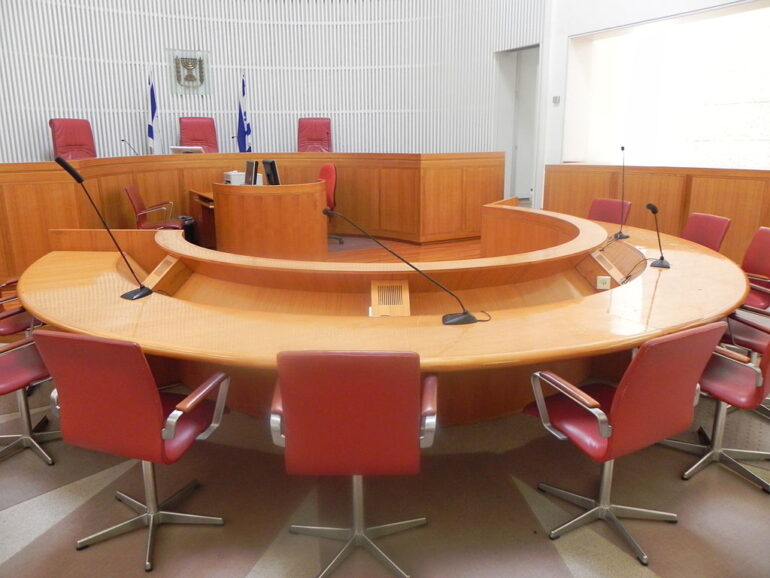Fulfilling one of their central campaign promises, the political factions comprising Israel’s new government has pushed ahead with a plan to dramatically reform the nation’s judiciary.
On February 21, the Knesset passed the first reading of the government’s proposed overhaul of the judiciary by a vote of 63-47. This legislation is the first phase of the government’s judicial reform plan, and if the legislation passes its second and third readings, then it will empower the government to appoint judges and to block the Supreme Court from using its interpretation of Basic Laws to overrule the Knesset.
Supporters of judicial reform argue that it will restore much needed balance to Israel’s branches of government, while opponents claim that the government’s plan will end Israeli democracy.
So what exactly is the proposed reform?
The government’s proposal would essentially change five aspects of Israel’s judiciary and the state’s balance of power.
Judicial Selection
Supreme Court justices are currently selected by a committee composed of sitting judges, Israel Bar Association representatives, Knesset lawmakers, and government ministers. Sitting judges and the bar association hold a majority of seats on the selection committee, which critics have argued has allowed the Supreme Court judges to select their successors without any meaningful input from the people or its elected representatives. This is in stark contrast to other ostensibly democratic societies, like the United States, where judges are appointed by elected officials or directly by the people.
It is perhaps no surprise that the current selection process in Israel has historically produced an ideologically homogeneous Supreme Court, with no representation of Ḥaredi or traditional Mizraḥi Jews, and rare representation of the national religious public. The court also has a track record of ruling against the Ḥaredi, national religious, and more traditional Jewish public, such as ordering the destruction of Jewish homes and yeshivot in the West Bank or invalidating laws that exempt Ḥaredi men from military service.
The government’s proposed reform would give the majority of votes on the selection committee to elected officials from the majority coalition-government. Proponents argue that this would make the selection process more responsive to the will of the people, and in time, lead to more diversity on the court that reflects the people it rules over.
Government Legal Advisors
Under the current system, the Attorney-General appoints legal advisors to government ministries in order to assist said ministries with crafting policies. They might also issue legally binding opinions that control what ministries can and cannot do. The current system creates additional hurdles for crafting policy by enabling adversarial relationships between ministers and their own legal advisors.
Critics argue that policy should be decided through the electoral process and the legislative process, with oversight by courts through the judicial system, rather than torpedoed from within by bureaucrats loyal to the judicial establishment. The proposed reform would see legal advisors appointed by the coalition. These legal advisors would serve the government, offer non-binding opinions, and change with each new government.
Constitutional Review
Unlike most democratic nations, Israel does not have a constitution. Instead, it has Basic Laws that have been passed over time through the legislative process and can be sees as the closest thing Israel has to constitutional laws. Currently, the Supreme Court has reserved the right to challenge and overrule Basic Laws, which is not something the courts of other nations do to their respective constitutions. Israel’s Supreme Court has also reserved the right to overrule regular laws without a full panel discussion or vote. This stands in contrast to the United States, where a majority of all Supreme Court justices is required to reject a law.
The coalition’s proposed judicial reform would remove the power of the Supreme Court to nullify Basic Laws. It would also require an eighty percent majority of the court to agree on rejecting a law. Critics argue that an 80% majority is excessive and not typical in other judicial systems.
Override Clause
The most controversial aspect of the proposed judicial reform has sought to give the Knesset the power to reinterpret the Supreme Court’s understanding of a Basic Law, and to override the court’s nullification of a law.
One version of the override clause has set the threshold to as low as a simple Knesset majority (61 lawmakers). Only a handful of other countries have similar provisions. In the United States, for example, overriding a Supreme Court decision requires a new constitutional amendment, or a gradual process of developing case precedents, and changing public opinion, to eventually lead to a change in the interpretation of law, or a new approach to public policy.
Standing and Unreasonableness
Arguably, the most controversial power of the Israeli Supreme Court is to unilaterally decide which laws to review and nullify. This includes the power to overturn administrative decisions through an expansive interpretation of the “unreasonableness” grounds of judicial review.
The coalition’s proposed reform seeks to curtail the court’s ability to overturn administrative decisions. The high courts of other democratic states generally don’t review a statute or regulation unless a real person exists that has been harmed and brings a lawsuit against the government that works its way up through lower courts.
The Israeli Supreme Court, by contrast, reserves the right to review any law if a person can articulate a hypothetical grievance or an issue of public or constitutional importance. Supporters of the existing system boast that Israel has the most accessible Supreme Court in the world. Critics argue that the court has amassed too much power, and made itself the undemocratic final decision maker on all laws, policies, and societal values – which is seen by some as especially problematic given the fact that the socio-cultural make up of Israel’s Supreme Court represents only a tiny privileged sliver of the population.
Power Struggle
The government’s judicial reform plan has led to a national and international crisis. The proposed reform has faced strong opposition from many Israelis, the media, Diaspora Jews, and Western government. Israel has seen large protests in Tel Aviv and outside the Knesset in Jerusaelm.
The large uproar, combined with US pressure, has created the real possibility of a coup, as we saw with the American-backed toppling of President Mohammed Morsi and Egypt’s first ever democratically elected government.
On the surface, the domestic and international backlash to the judicial reform can seem confusing. For example, why has the US government publicly come out against the proposed reform when the debate seems to be over an internal matter that would actually make Israel’s judiciary more similar to the American system?
Past the substantive debate over the proposed reform, there is a power struggle between different camps inside Israel, and between Washington and the new Israeli government.
Due to societal and demographic shifts, Israel’s Westernized ruling class has been gradually losing power since the Likud party first came to power in 1977. During the 1990s, then-Supreme Court President Aharon Barak led a judicial revolution that greatly increased the power of the judiciary. Many have therefore come to see the court as a bastion of Western values and a firewall against a trend of losing elections to nationalist and traditionalist forces that prioritize Jewish identity and values.
Despite repeated electoral victories, many Israelis that vote for nationalist and traditionalist parties came to see the Supreme Court as an obstacle to the democratic process. The court consistently overturned laws that protected Jewish communities in Gaza, Judea, and Samaria, and military deferment for Ḥaredi men.
Now for the first time, Israel has a governing coalition composed of exclusively nationalist and traditionalist political factions that is seeking to reduce the power of the judiciary. It seems that the two major camps in Israeli society are poised to fight for control over the future of the state.






Good article. I’ve always been a fan of the “for dummies” books.